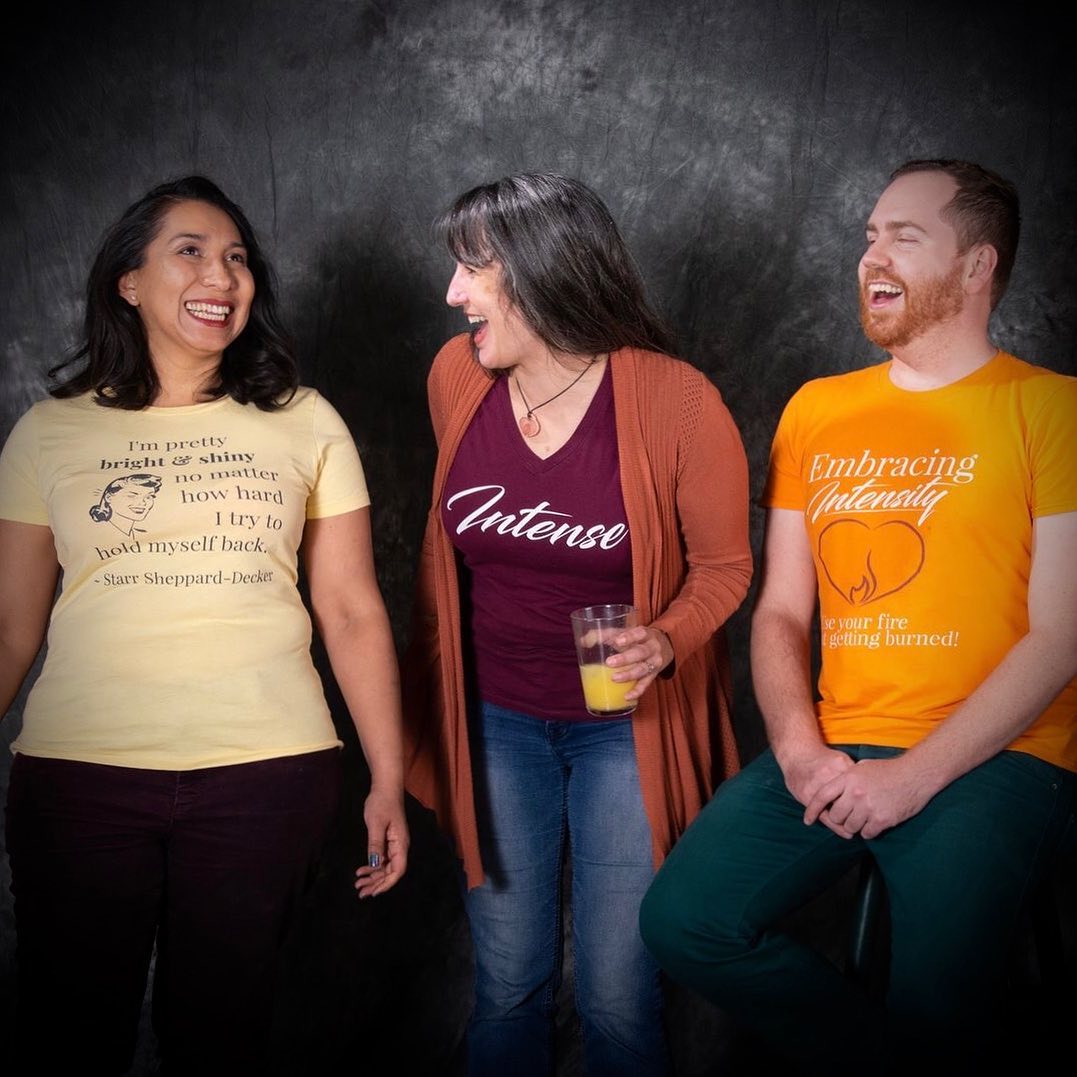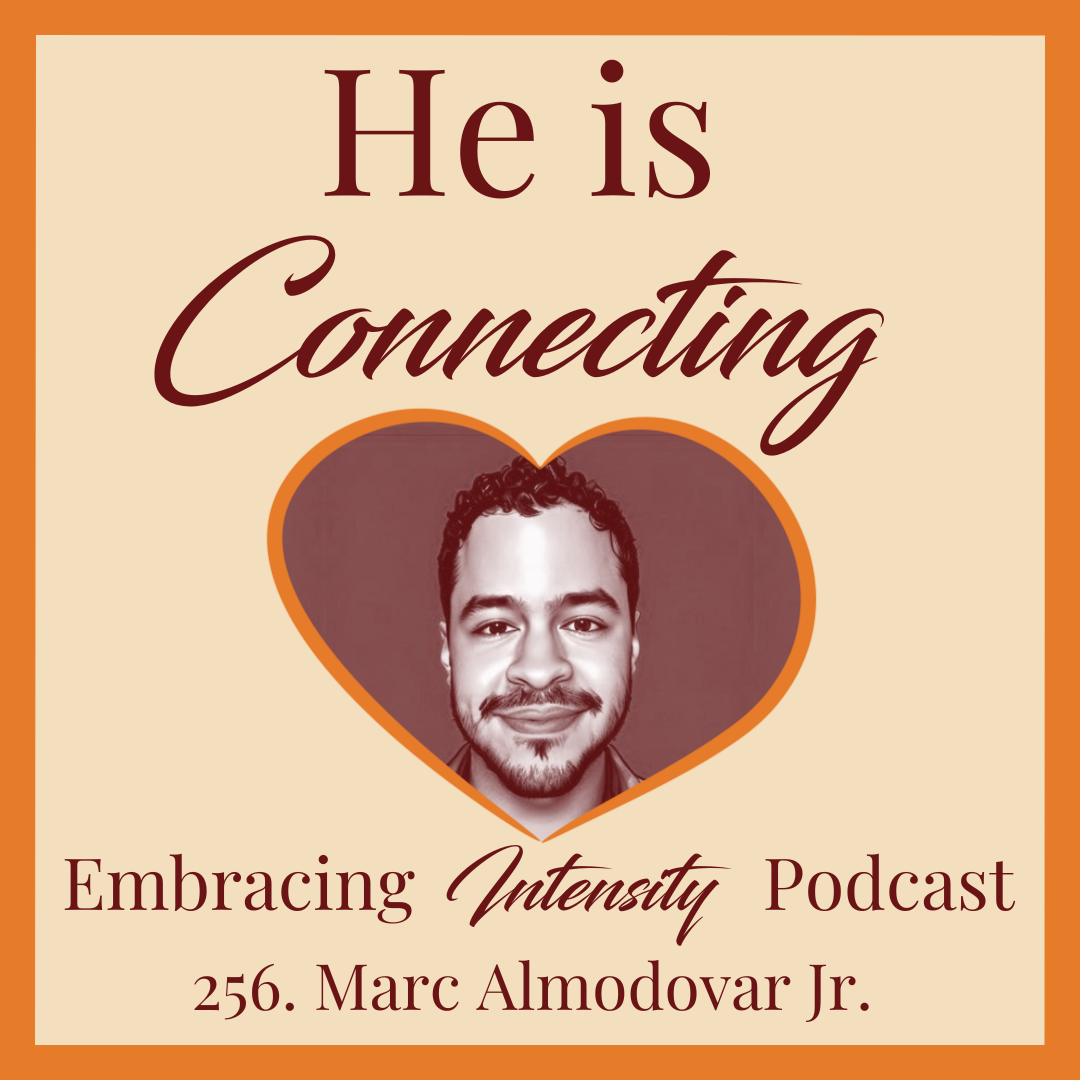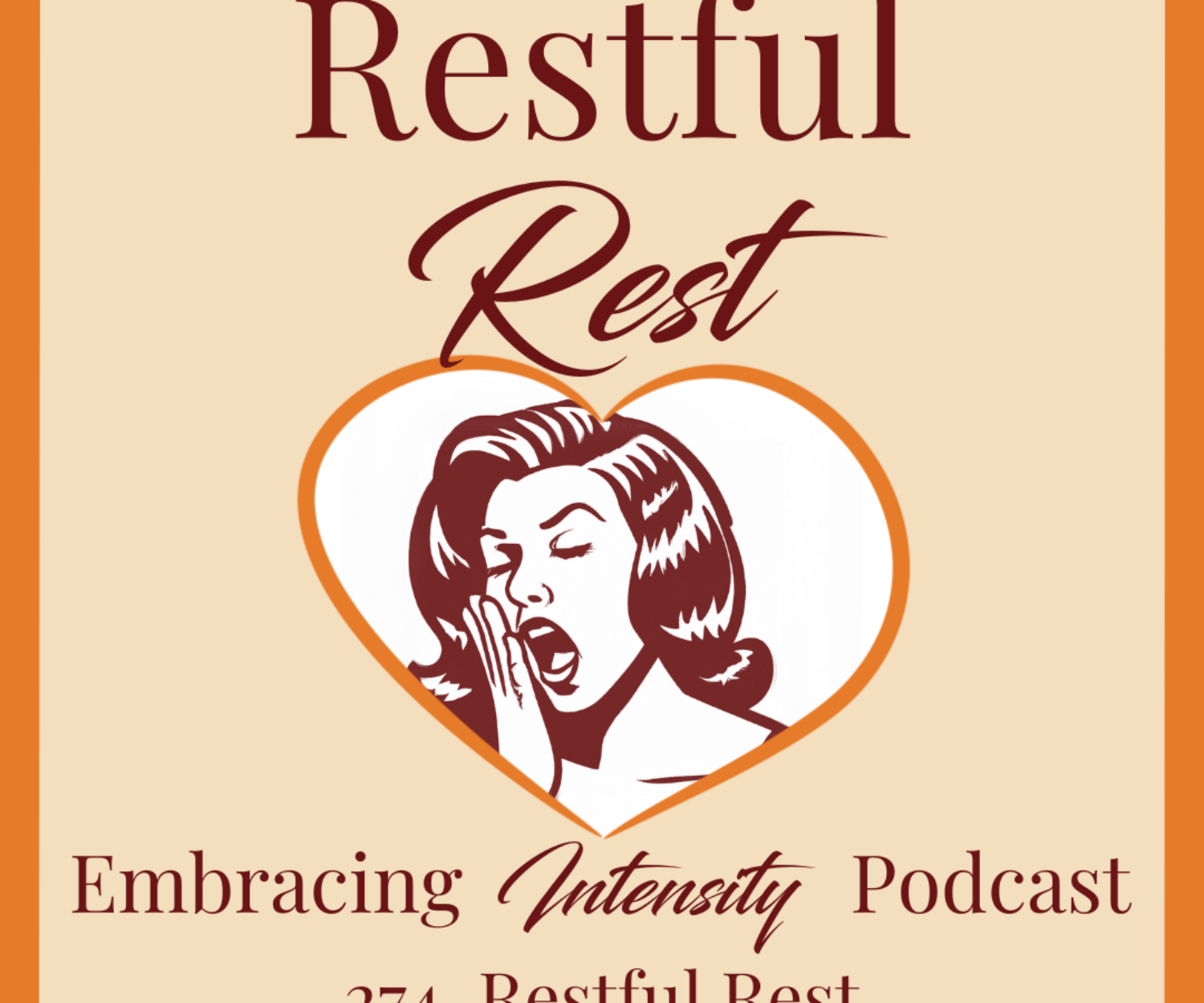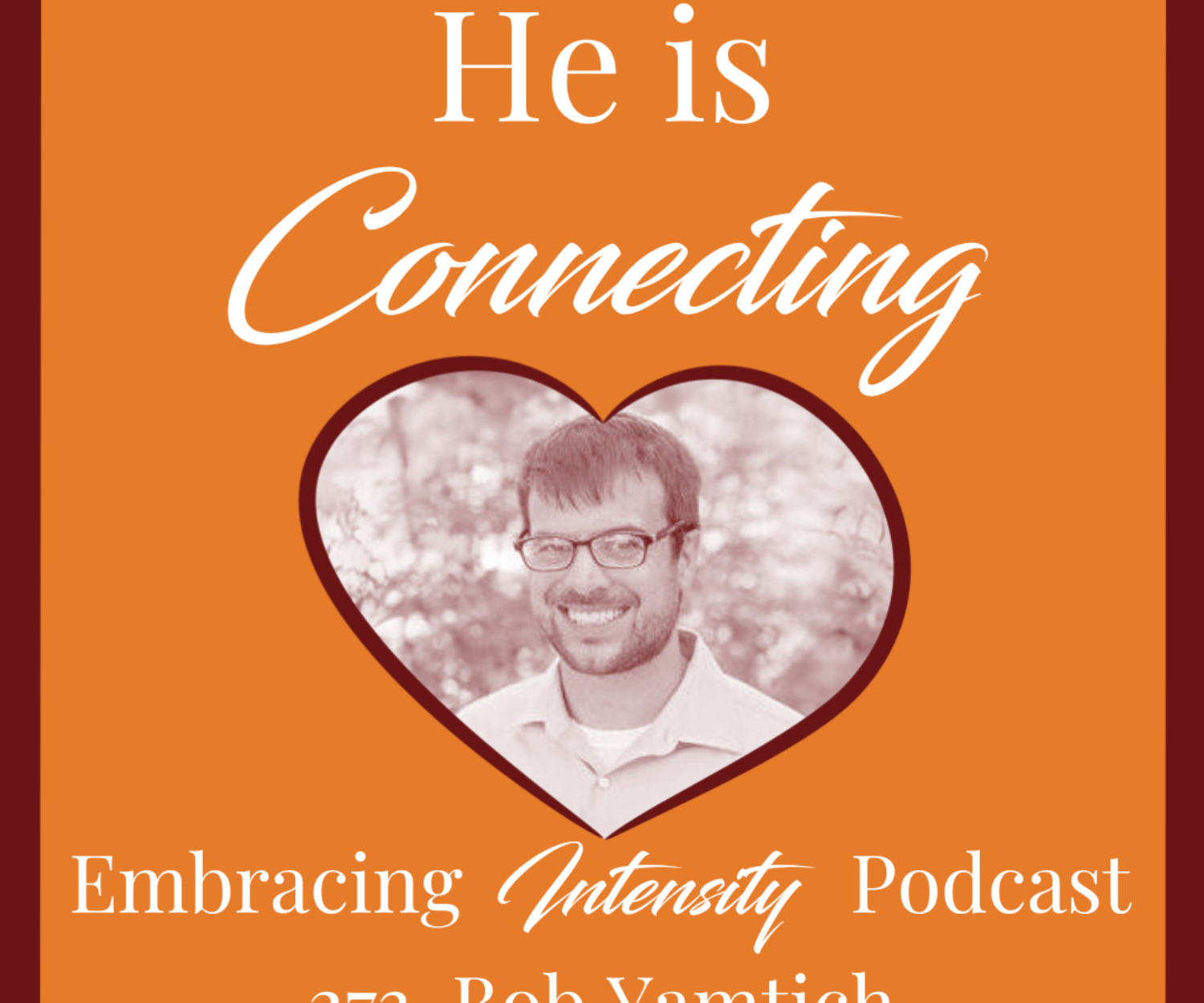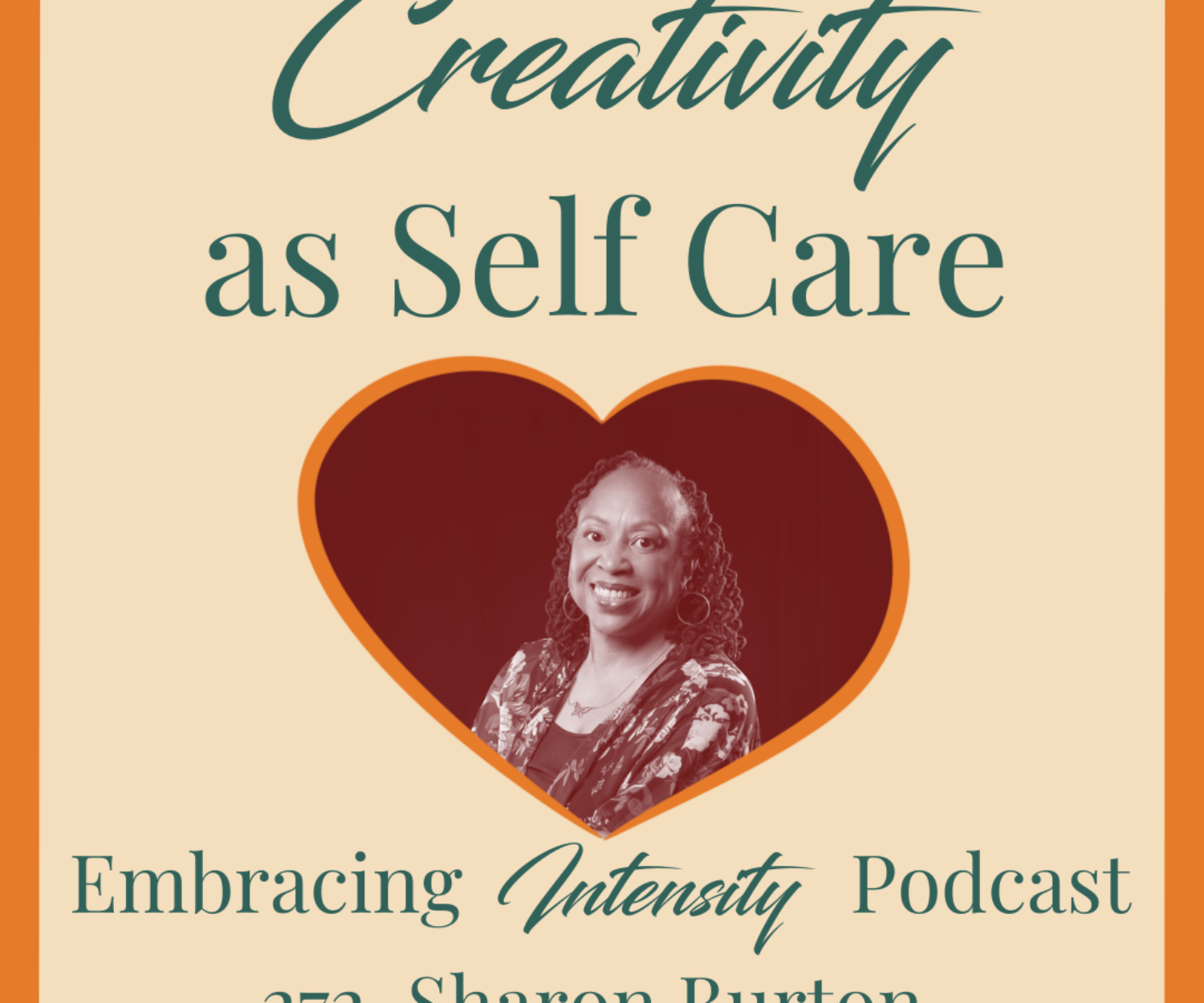This week’s episode of Embracing Intensity Podcast is with Marc Almodovar on Finding Neurodivergent Community.
The importance of neurodivergent community
Neurodivergent individuals are those who think, process information, and experience the world in ways that differ from the neurotypical (i.e., not neurodivergent) population. The neurodiversity movement advocates for the recognition and celebration of neurodiversity as a natural and valuable form of human diversity, similar to cultural, racial, or gender diversity. Neurodivergence is an important facet of the human race. It seeks to create a more inclusive and accepting society for neurodivergent people. Finding neurodivergent community can play a crucial role in connecting with other like-minded folks.
There are many different ways to be neurodivergent, and neurodivergent people may have unique ways of perceiving, learning, communicating, and interacting with the world. Neurodivergence can affect various brain functions such as attention, memory, and executive function, and can manifest in neurodevelopmental conditions such as ADHD, dyslexia, autism, and more. These neurodevelopmental differences can also provide unique perspectives that can lead to creative problem-solving.
Dominant societal standards have traditionally prioritized neurotypical values and perceptions, which can often leave out the rich perspectives of what neurodivergent people experience. The diversity of human brains and the ways in which they function can lead to new ideas and perspectives that can benefit society as a whole. By fostering an environment that is inclusive and accepting of neurodiversity, we can tap into the unique abilities and potential of neurodivergent people and create a more diverse and innovative society.
Building a solid neurodiversity network can help others connect over their common traits, and explore their own style of neurocognitive functioning.
Finding neurodivergent community
The Embracing Intensity Community is a supportive online space for gifted, creative, and neurodivergent individuals. It is a place where members can connect with others who share similar experiences and challenges, and find support and understanding. The community is designed to provide a safe and welcoming environment where members can discuss their unique perspectives, share their insights and skills, and explore their full potential. The goal of the Embracing Intensity Community is to empower gifted, creative, and neurodivergent individuals to embrace their intensity and to live fulfilling and meaningful lives.
Other neurodivergent community resources
There are a number of other ways that neurodivergent adults can find and connect with their neurodivergent community. Some options include:
- Online communities and forums: There are many online groups and forums specifically for neurodivergent people, where individuals can connect with others who share common experiences and challenges.
- Local support groups: Many cities and towns have support groups for neurodivergent people and their families. These groups can provide a sense of belonging, as well as practical advice and resources for navigating daily life as a neurodivergent person.
- Neurodiversity-focused events: There are often events and conferences focused on neurodiversity and the neurodiversity movement, where neurodivergent individuals can meet and connect with others.
- Professional organizations: There are professional organizations that advocate for and support neurodivergent individuals, such as CHADD, the Neurodiversity Project and the Dyslexia Foundation. You can also find local resources in many areas.
- College campuses: Colleges and Universities often have groups not only for neurodivergent students, but events for the larger community surrounding the school.
By finding and connecting with other neurodivergent people, individuals can find support, validation, and a sense of belonging. Neurodivergent people may also be able to share their experiences and offer insights and advice to others. Additionally, the neurodiversity movement promotes greater understanding and acceptance of neurodivergent people within society, which can help create a more inclusive and equitable world for all.
Neurodiversity advocates
Neurodiversity advocates play an important role in promoting the acceptance and celebration of neurodevelopment differences and the unique ways in which people experience and perceive the world. They often share their personal experiences as neurodivergent individuals and work to educate others about the concept of neurodiversity. They may also work to highlight the strengths and abilities of neurodiverse people, as well as the challenges they face. By sharing stories and experiences, neurodiversity advocates can help to build understanding and acceptance of neurodivergent individuals within society.
The neurodiversity movement is often seen as a social justice movement, as it seeks to create a more inclusive and equitable society for neurodivergent people. Neurodiversity advocates work to raise awareness about the infinite variation in the way people’s brains function and the diverse ways in which people experience the world.
One of the key roles of neurodiversity advocates is to connect neurodivergent individuals with the various neurodiversity resources that are available. This may include information about support groups, educational resources, and professional organizations that can help neurodiverse individuals navigate their daily lives and achieve their goals. In addition to advocating for neurodiversity within society, neurodiversity advocates may also work to build strong and supportive social relationships within the neurodivergent community. By connecting with others who share common experiences, neurodivergent individuals can find support, validation, and a sense of belonging.
Overall, the role of neurodiversity advocates is to promote understanding, acceptance, and celebration of the unique ways in which people’s brains function and the diverse ways in which people experience the world. By doing so, they help to create a more inclusive and equitable society for all.
About Marc
Marc Almodovar is a neurodiversity advocate, and the cofounder of the ADHD Men’s Support Group, a group specifically for men who have been diagnosed with attention deficit hyperactivity disorder (ADHD). Marc founded the group after his own personal experience with ADHD led him to feel isolated and misunderstood. He saw a need for a safe space where men with ADHD could connect with others who shared common experiences and challenges.
Through the ADHD Men’s Support Group, Marc aims to provide a sense of belonging and support for men with ADHD. He believes that by sharing stories and experiences, men with ADHD can find validation and understanding, and build strong and supportive relationships. Marc also hopes to raise awareness about the unique ways in which people’s brains function and the diverse ways in which people experience the world, as part of the larger neurodiversity movement.
Marc recognizes that mental illness can be stigmatized within society, and he hopes that the ADHD Men’s Support Group can be a place where men with ADHD can feel safe and supported, regardless of their unique ways of thinking and experiencing the world. He believes that by fostering a sense of belonging and acceptance within the group, men with ADHD can work together to advocate for neurodiversity awareness and acceptance within society as a whole. He strikes a unique balance between positive feel-good stories and authenticity, without resorting to toxic positivity.
ADHD Men’s Support Group
The ADHD Men’s support group is a group specifically for men who have been diagnosed with attention deficit hyperactivity disorder (ADHD). The group provides a space for men with ADHD to connect with others who share common experiences and challenges.
One of the main goals of the ADHD Men’s support group is to provide a sense of belonging and support for men with ADHD. Many men with ADHD may feel isolated or misunderstood due to the unique way in which their brains function and the neurodevelopment differences they experience. The ADHD Men’s support group can provide a safe and supportive environment where men can share their experiences and find validation and understanding.
In addition to providing support and a sense of belonging, an ADHD Men’s support group can also serve as a resource for men with ADHD. Group members may share information about treatment options, coping strategies, and other resources that can help men with ADHD navigate their daily lives. The ADHD Men’s support group can also be a place for men with ADHD to connect with others who share common interests and goals. Through group discussions and social interactions, men with ADHD can build strong and supportive relationships and work together to advocate for neurodiversity awareness and acceptance.
Overall, the ADHD Men’s support group can be a valuable resource for men with ADHD, providing support, validation, and a sense of belonging, as well as an opportunity to connect with others who share common experiences and goals. It can also be a place for men with ADHD to work towards social change and advocate for neurodiversity acceptance within society.
Explore More!
Giftedness * Identity * Intensity * Neurodivergence * Positive Disintegration * Relationships * Self Care * Self Regulation * Twice Exceptionality
In this episode:
- Marc Almodovar is a coach, speaker, and has ADHD
- He is passionate about community building and helping men with ADHD feel seen
- Marc started an online support group for men with ADHD and it has grown into a nonprofit organization
- The organization is the largest online community for men with ADHD
- It’s goal is to educate, empower, and inspire men with ADHD through community
- Marc enjoys chatting with other people with ADHD
- He struggled with understanding and managing his ADHD and had low self-confidence as a result
- Cultural factors, including a lack of awareness, education and understanding about ADHD, affected Marc’s ability to express himself and understand his own brain
- Marc did not have behavioral or impulsive issues, but he was often “toned out” or distracted
- He learned to tone himself down by learning to manage his time and energy, setting boundaries, and practicing self-care
- Marc has also learned to embrace his intensity and use it to his advantage by finding ways to channel it into his work and passions
- He has found that learning to manage his intensity has helped him to be more present and engaged in his relationships and activities
Creating neurodivergent community:
- Marc uses his intensity to create a space for others to be themselves and feel seen
- His personal brand is built on transparency and listening to others
- Marc has harnessed the power of his intensity by being true to himself and embracing his strengths
- He has found that by putting himself in spaces where he can be himself, he is able to use his speaking and active listening skills to connect with others and make a positive impact.
- Marc uses affirmations to hype himself up and boost his confidence before speaking events
- He helps others use their fire by sharing his own experiences and learning openly and transparently
- Marc believes that honesty and transparency are important and encourages others to embrace their intensity and not worry about pleasing everyone
- Marc emphasizes the importance of self-care and setting boundaries to manage intensity
- He advises others to embrace their passions and find ways to channel their intensity into their work and hobbies
- Marc encourages others to be kind to themselves and remember that it’s okay to not have everything figured out
Transcript
* Rough Transcript *
Ep. 256 – Finding Neurodivergent Community w/ Marc Almodovar
Introduction
Aurora: Hello. This week’s episode is the first interview episode I’ve done in quite a while. It’s with Marc Almodovar, who I’ve been connected with on social media for quite a while and have been meaning to get him on the show. He’s always so affirming and genuine in all of his posts.
I missed our December episode, so there’ll be two for January, and the next one will be our first guest call of 2023 with Dr. Zarya Rubin on burnout. I’ll be announcing the rest of the season by the end of the month.
Last month I was busy resting for my own extended burnout, but I did manage to finally get dated planners done for my new monthly planner club. I’ll be adding a few more by the end of the weekend, and I’m adding new content monthly, including prioritization, problem solving, and self-care tools, especially for neurodivergent brains.
You can join the planner club at ndplanners.com for just $10 a month and save 50% off the first month with the code intensity.
Welcome
Aurora: Welcome to Embracing Intensity Today, I am super thrilled to have Mark Almodovar, who I have been connected with on Twitter and other social media for quite a few years, and he is always just a ray of sunshine on my feed.
So, I’m super excited to finally have him in for an interview, and it’s been quite a while since I’ve had an actual interview episode, so I’m super thrilled to share. Welcome.
Marc: Thank you for having me. Super excited to be here.
Intensely Passionate
Aurora: So glad to finally get connected. So, tell me a little bit about yourself and what you are intensely passionate about.
Marc: So, yeah, my name is Marc Almodovar. I’m a coach. I’m a speaker and most definitely somebody with an A D H D brain myself. When I look at my work within the community and how I make a dent, I. Have absolutely fallen in love with the idea of community building. About three, four years ago, as I was stepping into the A D H D space, I had noticed that there wasn’t any dedicated space for men with A D H D, at least nothing like what we’re doing at the moment.
So, I was going for a walk and had a small, little impulsive idea of, you know, why don’t I try out a men’s A D H D support group, see how that works out, experiment with it on Facebook. And years later, here I am with the group is now a nonprofit organization. We’ve grown into the largest online community for men with ADHD, and we get great joy from.
Basically, helping men with A D H D feel seen and educating, empowering and inspiring one another through community. That’s what I do and I have a lot of fun chatting with other ADHDers.
Aurora: That’s awesome. And I’m so proud of everything you’ve accomplished in the last few years. Cause I remember when you guys were just starting out, so you guys have done so much.
Marc: Thank you.
Personal Brand of Intensity
Aurora: Tell me a little bit about your own personal brand of intensity. So, this podcast being embracing intensity. What does intensity look like in your life?
Marc: Intensity. I think everything is almost intense for me. When I involve myself in something, I don’t really know what the word moderation means, right?
I have always been just all or nothing. So, in intensity for me, what stands out is really just community building, right? Like, three years ago, or two years ago now, when the pandemic really kicked off, my group had started to grow tremendously. And I remember I was having a phone call with my buddy who some people may know John Hazelwood, he’s our nonprofit’s vice president.He was like, let’s try out a Zoom meeting, see how it works. And I did the first one hosted that, and I absolutely fell in love with it, right? So, I am very intense and focused towards looking into spaces both in person and online where I can use my active listening skills, do the thing that I do in hosting events and making people feel seen, like that’s what’s really exciting me these days.
And to be able to do that, and on a professional level to me is just really cool. But as far as what’s keeping me up at night as far as what I’m hyper focusing on, on YouTube and Google searches and everything like that, it’s a lot of what it means to build. successful community
So that’s what’s intense for me.
Intensity growing up
Aurora: Awesome. That is so cool. So how do you think your intensity affected you growing up?
Marc: The biggest thing that stands out for me, my hyper focus. Right? So, I remember as a child that it would be such an extreme. Hyper focused. Like for example, something like Batman. I, I was the kid that was walking out of movie theaters pretending he, as if he was Batman, would wear Batman costumes all throughout the year, even when it’s not Halloween, right?
All that type of stuff. I almost didn’t really know how to not make something that I liked my whole life. Right? So, that was one of the first indicators for me that I operated a little bit differently than everyone else because it was such like a on and off focus, like something like math or history.
I mean, it didn’t capture my attention at all, but when something did manage to capture my intention, like I said, it was my whole life, right? So, I think that intensity has been just again unbelievable levels of hyperfocus that nowadays has to be managed and I have to intentionally take time off and all that.
But throughout my whole life it’s been like this on off switch. No. In between.
Cultural Factors
Aurora: Yeah, totally get that. Do you think there were any cultural factors that affected how you could express yourself?
Marc: None that I -well, the biggest thing that comes to mind, and I think I’m answering your question, I’m not sure, but I’m gonna roll with it because it sounds cool in my brain. I think a lot about Hispanics and ADHDers. A lot of Puerto Rican and Cuban households don’t really have an understanding of how this brain works, right?
So, I am passionate about assisting in the education here and tools and things we can do to work with kids and adults with A D H D, especially in Latinx communities and whatnot. But I think I, I think, and if anything affected me culturally, right? And love my mom and I love my dad and whatnot, but I think if anything affected me culturally, it’s a misunderstanding of how my brain worked, right?
It’s this idea that there was something wrong with me or something I was not doing, or not applying myself enough, all that type of stuff. So, there was a lot of misunderstanding that did lead to struggles with self-confidence and whatnot growing up. And. Led to my adulthood, you know, being a space where I’ve had to really learn to love who I am and figure out all the tools that I need to operate day to day.
But that’s what stands out for me culturally, lack of education and a complete misunderstanding of how my brain worked.
Tuning Out
Aurora: Yeah. Yeah, I can totally see that. Did you ever have to tone yourself down or tune yourself?
Marc: Tone myself down. The hyperactivity was in my brain. I was the inattentive ADHDer. When I would get my report cards, it would say things like Mark was there, but never really there. Right? I was the kid with sloppy handwriting, disorganized desks. So, I can’t say that I’ve ever had to tone myself down.
I didn’t really have behavioral or impulsive issues, but I was definitely, I think, toned out all the time in a way. I was the kid that didn’t get distracted every now and then, but lived in distraction, right? So, it’s interesting for me to take on that question because I wasn’t really, I had a reputation for being a very chill and calm kid.
It’s interesting cuz I was chill and calm, but at the same time I was not, I don’t know how to describe that super well.
Aurora: No, I totally get it. Cause when. Yeah. No, I totally get it. Cause sometimes I have people, when I tell them that I have a podcast about intensity and community and all that about intensity.
They’re like, but you don’t seem very intense. I’m like, well…
Marc: yeah.
Aurora: I have a calming presence around people and I think you probably do too, from what I’ve gathered from your, you know, following you over the years.
Toning Down
Marc: Yeah. Although I’m gonna slightly change my answer now that I think about it. There are actually were moments that – by the way, a lot of the questions that you’re asking me are exciting for me because this is my first time ever reflecting on any of these. This is the most different interview I’ve done so far. Super cool. There was intensity as a kid. I remember when I would. Show somebody a movie or something that I was excited about or a TV show or any toys that I had going on.
It was still that extreme level of hyperfocus focus and excitement to the point where my dad always jokes about this with me nowadays, but when he would watch a movie with me, he knows that I would get frustrated if somebody. Got up for through throughout the movie for a snack or something like that.
Like the slightest moment of distraction almost bothered me because it was like, why? You’re not as excited about this as I am, right? I have a memory of watching an animated show with my older sister and she fell asleep and took a nap, for about two, three hours, and I paused it, and when she finally got back up, I hit the play button again.
Mind you, this is before like smartphones and everything like that. So, I literally waited. In silence for two, three hours. As soon as she got back up, I hit that play button again. I’m like, oh good, you’re back up. We can keep watching. She goes, oh God. But that was my intensity, that I had to learn to moderate, but yeah. I was a little intense now that I think about it.
Intensity out of control
Aurora: Yeah. Not everybody has the same enthusiasm. I’ve learned that. Did you ever feel like your intensity felt out of control?
Marc: I don’t think so. I can’t….
Aurora: Like times when maybe you were so hyper focused on something that you start, you ignored your basic needs. That could be.
Marc: Okay.
Aurora: I mean that
Marc: Oh, many times. Many times, that’s where I’ve had to, or continue to learn to manage it. I haven’t mastered this yet.
There are many moments where I do experience burnout and I say yes to too many things. And I get overly excited and I look at my schedule and it’s crazy booked. But it’s, it is one of those things for me, where it’s been a great strength of mine, but also something, when it goes unmanaged, like you just said, like other areas of my life tend to not be prioritized.
Like, my room will be disorganized, my health won’t be as good. I’m tired all the time and whatnot. So, for me, it’s almost about learning how to actually be proactive about pausing. And watching out, because sometimes when we get hyper-focused, our brains almost lie to us in a way, right?
Like it tells us like, yes, you can do 50 million things at once. Yes, you can be this and that, and this and that, but we do have to, we do have to know our limits.
Aurora: Yeah.
Marc: And the importance of rest to continue going. So,
Aurora: yeah, totally.
Marc: Yes, there have been moments, actually.
Health Coaching
Aurora: Now, am I remembering correctly, did you do stuff around health coaching before you got into the A D H D stuff or when you started?
Marc: I did, this was about three, four years ago. I had started off my personal brand as wellness with Marc. And I, I didn’t really like that for myself because I just don’t want to limit myself to just one particular thing. Like, I have other things I wanna talk about. I want to talk about being highly sensitive.
I want to talk about men’s mental health, right? And, just limiting myself to the health coaching thing. I felt that I wasn’t able to express those different things. So, it did start off as health coaching, and then I learned a lot about life coaching. And, it’s basically been a bunch of experimenting and tasting up until I got here doing this work for people with ADHD.
Aurora: Yeah. Yeah. Awesome. I was just trying to, I thought I had seen that a while back.
Marc: Yep, yep. This is true.
Aurora: I actually started as a food blogger and now I eat terribly. But, I’m trying to find my way back.
Marc: Oh, I eat terribly too. Yeah. My health, my diet is nowhere near what it once was about four or five years ago. Yeah. So, yeah, I hear you.
Using his fire for good!
Aurora: I feel that totally. So, tell me a little bit more about how you use your fire for Good.
Marc: I use my Fire for Good through the engagement that I have with my members. And creating a space in which people can actually be themselves, and I’m showing people who I am, right? I don’t, I’m not an A D H D coach who has his life hall figured out. Neither is anyone, right? I am still learning quite a lot myself. Like I’ll be up upfront as far as the intensity, hyper-focused thing. That’s something where I can be on and off, right?
So, for me, with building a personal brand that’s built off of transparency and listening to other people. I use my firepower to really just show people that they are not alone, that independent of. Where you are in your life and your self-awareness and your career, you can still have quite a high amount of self-confidence and you should have it.
And my firepower continues to be a gift in these areas. Like I said, I make people feel seen. I am extremely creative. I love being a leader, right? That’s one of the greatest things about, for me at least, about being a highly sensitive person. It’s activated my leadership skills so much where I’ve created a team where the people who are inspired by our mission and want to do the work, and that’s something I’m really proud of.
But I use my firepower to help men with ADHD feel seen via community and it’s a gift and I get so much fulfillment from it.
Harnessing the Power of Intensity
Aurora: That’s awesome. So, what do you think has helped you the most with harnessing the power of your intensity?
Marc: Putting myself in spaces in which I can actually be myself and I’m not putting on a front, right? like, one of the minor changes that I’ve made is I used to be wellness with Mark on all social media platforms, but now it’s just my name, right? So, I’m literally just sharing me with the world.
When I talk with the A D H D audience. Like when I talk to people like you. I know that I can be my full-on self and I know that I can comfortably tell you that for a moment there. I forgot what the question was during the interview. And that’s, this is a space where that’s, you know, like where I bring smiles and that’s accepted.
So, I put myself in a position in which my strengths are working for me, and I’m not trying to be something that I’m not, right? It’s not something that’s administrative, super organized, it’s a space in which I can use my speaking skills. It’s a space where I can use my active listening skills and just be me.That’s something that’s been a tremendous tool for me in everything that I do.
Personal Habits
Aurora: Awesome. So, are there any personal habits that have helped you to use your fire in a positive way?
Marc: habits? I am, I would say that I’m not that good with habits. I mean, there’s a few tools that I use. Like when I when I’m here and doing speaking events virtually and everything like that, like I love standing desks. I find that works great for my brain, like little things like that.
But I can’t say that I, I’ve really. Mastered like, or done any morning routines and all that type of stuff. I can see that word. I see how it works for quite a lot of people. But I mean, I would say if there is one thing, before I do a speaking event, before I host any type of community event in our group, I love,
I love looking at myself in the mirror and hyping myself up. I’ve learned to be my biggest advocate in that way. I’m actually really proud of that one right there, just reminding myself of the people that I’ve helped, how far I’ve come along. Like yesterday for the first time in a while, I saw my first ever piece of content and how much I’ve grown as a speaker as a result.
So, I love to hype myself up and celebrate my wins. that gets me going and puts me at a state of confidence where I can deliver the best of the best version of myself to whatever audience I’m speaking to. So, affirmations, that’s a big one for me.
Helping others use their fire
Aurora: Awesome. Yes, that is indeed. So how do you help others use their own fire?
Marc: By sharing openly and being transparent. I’m somebody who loves to learn quite a lot about what it means to operate as like a highly sensitive individual and as someone with A D H D. So, I do not play or pretend as if I’m this social media guru who has a completely nailed. I’m sharing as I learn in an open and transparent way, right?
Like I’ll talk about something I’ve learned in relationships as I have just dealt with somebody ghosting and leaving me and how I’m processing that, right? I share as I learn and that seems to really resonate with a lot of people. Years and years ago, I thought I had to pretend as if I knew all the answers cuz of a book that I read or something like that.
but that’s not really the case. It turns out people really react well to seeing me actually be me. And then share things as I learn in my life.
Acknowledging what you don’t know
Aurora: Yeah. Yeah, totally. And it’s funny when you say that about pretending that you already know. Like I, when I see that, in real life. Like sometimes it really bothers me when I know these people are like, they’re pretending to be masters of something, that they’re just learning
Marc: Yeah.
Aurora: So, I feel like that transparency is really beneficial.
Marc: Yeah. Like even when you asked me the question about habits. I’ll tell you right now, I woke up this morning and I looked at my cell phone, right? that’s, you know, like I don’t have this part down. If I can say anything to myself and three years ago and any other content creators, is that it’s also, it’s okay to not know.
Aurora: Yeah.
Marc: Right?
Aurora: Yeah totally.
Marc: It’s okay. Like, you know, like honesty and transparency goes a long way, so,
Anything else to share?
Aurora: yeah. Totally. Awesome. Well, is there anything else you’d like to share with the embracing intensity audience?
Marc: I love the subject of intensity. I had tweeted this yesterday. And it’s worth sharing again. There’s always gonna be people out there who you are too much for, right? I get that all the time in my life, not all the time. But I’ve gotten it plenty. Marc is always talking about this. And Mark is always super excited about people with A D H D or whatever music he’s listening to and all that.
There are always people out there who we’re gonna be too much for. And to be very clear, that’s their problem. that’s how I feel. It’s a little bit of an arrogant side of me, but it’s true in my opinion. that’s their problem. I’ve learned that what matters the most is that I am my own cup of tea.
I’m not gonna be everybody’s cup of tea, and that’s perfectly fine.
Aurora: totally.
Marc: People like me who are highly excited, highly intense, which I’m gonna start using that word a little bit more. You’ve inspired me. have a place in this world and so do all of you. That’s all I got.
Where to find Marc
Aurora: Awesome. And how can they find out more about you?
Marc: So, you can learn more about me. If you search up men’s ADHD support group.org, you can see all the content that we offer. We have bios for every single person that does work within our community, including my own. And we are Men’s ADHD support on Facebook, discord Twitter.
All that. Just Google Men’s ADHD support group and you will learn more about what we do.
Aurora: Awesome. Well, I can’t wait to share and thank you so much for taking time to talk with me today.
Marc: Awesome. Thank you so much. This is fun.

